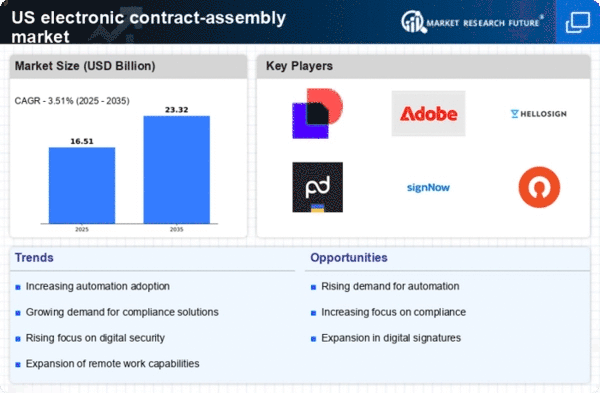Shift Towards Remote Work
The ongoing shift towards remote work has a profound impact on the electronic contract-assembly market. As organizations adapt to flexible work arrangements, the demand for digital contract solutions has intensified. In 2025, it is anticipated that remote work will constitute over 30% of the workforce, necessitating efficient electronic contract assembly tools that facilitate collaboration among distributed teams. This trend encourages the development of user-friendly platforms that enable seamless contract creation and management, ultimately enhancing productivity. Consequently, the electronic contract-assembly market is poised for growth as businesses seek solutions that cater to the evolving dynamics of remote work.
Regulatory Compliance Pressures
The electronic contract-assembly market is significantly influenced by the increasing pressures of regulatory compliance. As businesses navigate complex legal landscapes, the need for compliant contract management solutions becomes paramount. In 2025, it is estimated that compliance-related expenditures will account for nearly 20% of operational budgets in various sectors. This trend compels organizations to adopt electronic contract assembly systems that ensure adherence to legal standards and reduce the risk of penalties. By automating compliance checks and maintaining accurate records, businesses can mitigate risks associated with non-compliance, thereby driving growth in the electronic contract-assembly market.
Increased Focus on User Experience
The electronic contract-assembly market is increasingly prioritizing user experience as a critical driver of growth. Companies are recognizing that intuitive interfaces and streamlined processes are essential for user adoption. In 2025, it is expected that user experience enhancements will lead to a 40% increase in customer satisfaction ratings for electronic contract solutions. This focus on usability encourages vendors to innovate and create more accessible platforms, catering to a broader audience. As businesses seek to improve their contract management processes, the electronic contract-assembly market is likely to thrive, driven by the demand for user-friendly solutions that enhance overall efficiency.
Rising Demand for Digital Solutions
The electronic contract-assembly market experiences a notable surge in demand for digital solutions as businesses increasingly seek to streamline their operations. This trend is driven by the need for efficiency and cost reduction, with companies aiming to minimize manual processes. In 2025, the market is projected to grow at a CAGR of approximately 15%, reflecting a shift towards digital transformation. Organizations are recognizing the advantages of electronic contract assembly, which not only expedites the contract creation process but also enhances accuracy. As more firms adopt digital tools, the electronic contract-assembly market is likely to expand, catering to a diverse range of industries, including finance, real estate, and legal services.
Integration of Advanced Technologies
The electronic contract-assembly market is witnessing a transformative phase with the integration of advanced technologies such as blockchain and machine learning. These innovations enhance the security and efficiency of contract management processes. In 2025, it is projected that the adoption of blockchain technology in contract assembly will increase by approximately 25%, providing a secure and transparent framework for transactions. This technological evolution not only streamlines workflows but also builds trust among stakeholders. As organizations recognize the potential of these technologies, the electronic contract-assembly market is likely to experience accelerated growth, driven by the demand for more sophisticated solutions.
















